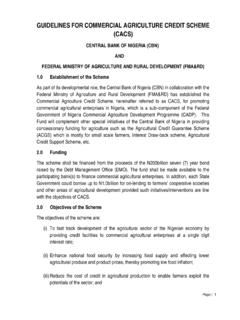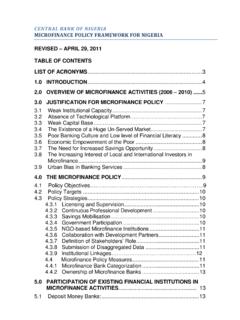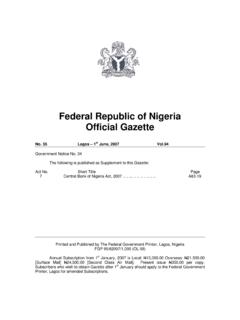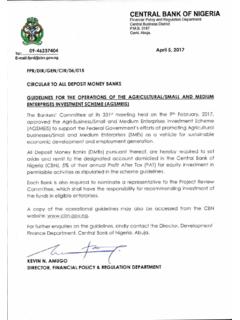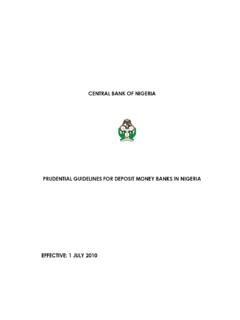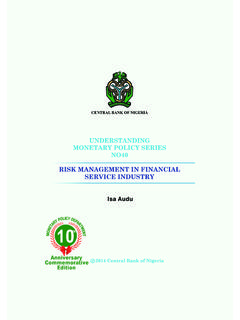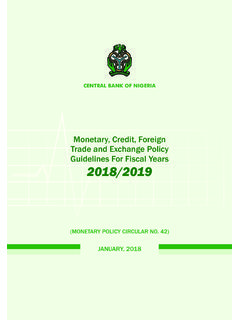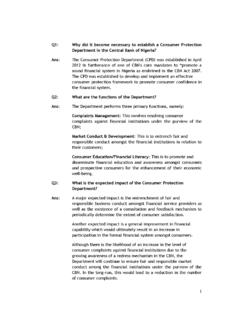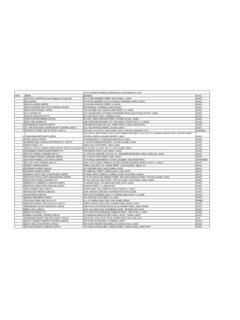Transcription of UNDERSTANDING MONETARY POLICY SERIES NO …
1 CENTRAL BANK OF NIGERIAUNDERSTANDING MONETARY POLICY SERIESNO 31c 2013 Central Bank of NigeriaTHE NIGERIAN BONDS MARKETO luwafemi I. AjayiOluwafemi I. AjayiCentral Bank of Nigeria33 Tafawa Balewa WayCentral Business 0187 Garki, AbujaPhone: +234(0)946236011 Fax: +234(0)946236012 Website: E-mail: Central Bank of Nigeria 978-978-52863-4-2iiiCentral Bank of NigeriaUnderstanding MONETARY PolicySeries 31, July 2013 EDITORIAL TEAMEDITOR-IN-CHIEFMANAGING EDITOREDITORASSOCIATE EDITORSAims and ScopeSubscription and Moses K. TuleAdemola BamideleCharles C. EzemaVictor U. ObohDavid E. OmoregieUmar B. Ndako Agwu S. OkoroAdegoke I. AdelekeOluwafemi I. Ajayi Sunday Oladunni UNDERSTANDING MONETARY POLICY SERIES are designed to improve MONETARY POLICY communication as well as economic literacy. The SERIES attempt to bring the technical aspects of MONETARY POLICY closer to the critical stakeholders who may not have had formal training in MONETARY Management. The contents of the publication are therefore, intended for general information only.
2 While necessary care was taken to ensure the inclusion of information in the publication to aid proper UNDERSTANDING of the MONETARY POLICY process and concepts, the Bank would not be liable for the interpretation or application of any piece of information contained to UNDERSTANDING MONETARY POLICY SERIES is available to the general public free of charge. The copyright of this publication is vested in the Central Bank of Nigeria. However, contents may be cited, reproduced, stored or transmitted without permission. Nonetheless, due credit must be given to the Central Bank of concerning this publication should be forwarded to: Director, MONETARY POLICY Department, Central Bank of Nigeria, 0187, Garki, Abuja, Nigeria, ivCentral Bank of NigeriaMandateVisionMission StatementCore Values Ensure MONETARY and price stability Issue legal tender currency in Nigeria Maintain external reserves to safeguard the international value of the legal tender currency Promote a sound financial system in Nigeria Act as banker and provide economic and financialadvice to the Federal Government By 2015, be the model Central Bank deliveringPrice and Financial System Stability and promotingSustainable Economic Development To be proactive in providing a stable framework for theeconomic development of Nigeria through theeffective.
3 Efficient and transparent implementationof MONETARY and exchange rate POLICY andmanagement of the financial sector Meritocracy Leadership Learning Customer-FocusvMONETARY POLICY DEPARTMENTM andateTo Facilitate the Conceptualization and Design ofMonetary POLICY of the Central Bank of NigeriaVision To be Efficient and Effective in Promoting theAttainment and Sustenance of MONETARY andPrice Stability Objective of the Central Bank of NigeriaMission To Provide a Dynamic Evidence-basedAnalytical Framework for the Formulation andImplementation of MONETARY POLICY forOptimal Economic GrowthThe UNDERSTANDING MONETARY POLICY SERIES is designed to support the communication of MONETARY POLICY by the Central Bank of Nigeria (CBN). The SERIES therefore, provides a platform for explaining the basic concepts/operations, required to effectively understand the MONETARY POLICY of the Bank. MONETARY POLICY remains a very vague subject area to the vast majority of people; in spite of the abundance of literature available on the subject matter, most of which tend to adopt a formal and rigorous professional approach, typical of macroeconomic analysis.
4 However, most public analysts tend to pontificate on what direction MONETARY POLICY should be, and are quick to identify when in their opinion, the Central Bank has taken a wrong turn in its MONETARY POLICY , often however, wrongly because they do not have the data for such back of the envelope analysis. In this SERIES , public POLICY makers, POLICY analysts, businessmen, politicians, public sector administrators and other professionals, who are keen to learn the basic concepts of MONETARY POLICY and some technical aspects of central banking and their applications, would be treated to a menu of key MONETARY POLICY subject areas and may also have an opportunity to enrich their knowledge base of the key issues. In order to achieve the primary objective of the SERIES therefore, our target audience include people with little or no knowledge of macroeconomics and the science of central banking and yet are keen to follow the debate on MONETARY POLICY issues, and have a vision to extract beneficial information from the process, and the audience for whom decisions of the central bank makes them crucial stakeholders.
5 The SERIES will therefore, be useful not only to POLICY makers, businessmen, academicians and investors, but to a wide range of people from all walks of a central bank, we hope that this SERIES will help improve the level of literacy in MONETARY POLICY as well as demystify the general idea surrounding MONETARY POLICY formulation. We welcome insights from the public as we look forward to delivering content that directly address the requirements of our readers and to ensure that the SERIES are constantly updated as well as being widely and readily available to the K. TuleDirector, MONETARY POLICY DepartmentCentral Bank of NigeriaFOREWORD CONTENTSviiSection One: IntroductionSection Two: The Classification of the Bond Market Section Three: Evolution of the Nigerian Bond MarketSection Four: The Structure of the Bond Market in NigeriaSection Five: Characteristics of a BondSection Six: Challenges of the Nigerian Bond Market Section Seven: Conclusion and and Local Governments/Municipal Bonds (munis).
6 's Bond Market Federal Government of Nigeria (FGN) Development Federal Government of Nigeria (FGN) Treasury State and Local Governments Industrial Loan Stocks .. Unsecured Zero Coupon Redeemable Convertible Stocks .. AMCON Institutions in the Bond Market .. Debt Management Central Bank of Nigeria (CBN).. Nigerian Stock Exchange (NSE).. Central Securities Clearing Systems Ltd (CSCS).. Security and Exchange Commission (SEC).. & Service Mechanisms: Quotes and THE NIGERIAN BONDS MARKET 1 T H E N I G E R I A N B O N D S M A R K E T 1 Oluwafemi I. Ajayi2 SECTION ONE Introduction By definition, a bond is a debt instrument issued by a government or a corporate entity to raise fund to finance budget or projects. It is usually issued for a period of time more than a year. It is an 'IOU' with a preset interest rate, redeemable at the expiration of the specified tenor. Individual investors can borrow money to expand their businesses through bond with different options from pension funds or mutual funds.
7 Largely, bond is meant to be a promise to pay back the principal alongside with interest, which is the coupon, on a specified date, usually referred to as maturity date. The investor who buys/invests in bond becomes a creditor of the issuer. Unlike in the case of equities, the buyer of bond does not gain any kind of ownership right to the issuer. However, in the time of financial distress, the shareholders have lesser claim on an issuer's assets compared to bond holder. Companies issue bonds and sell them to the public at various interest rates, and investors buy with the full knowledge that the company will repay the original principal with interest at the maturity date. The Bond market is an environment where debt securities are issued and traded. It comprises both the primary market where new debts are issued to participants, and secondary markets-where participants can buy and sell debt securities.
8 The bond market mainly covers corporate debt securities and government-issued securities. The operation of the bonds market helps to move funds from savers to investors/fund users for business expansions or investments. It provides a platform for long term funding of public and private expenditures. In Nigeria, bonds issuing started in 1946 when the federal government was channeling the proceeds to finance construction projects. This continued until 1960, when the Nigeria Stock Exchange was established and became fully operational in 1961. After the establishment of the NSE, some of the bonds that were issued were on a yearly 1 This publication is not a product of vigorous empirical research. It is designed specifically as an educational material for enlightenment on the MONETARY POLICY of the Bank. Consequently, the Central Bank of Nigeria (CBN) does not take responsibility for the accuracy of the contents of this publication as it does not represent the official views or position of the Bank on the subject matter.
9 2 Oluwafemi I. Ajayi is an Economist in the MONETARY POLICY Department, Central Bank of Nigeria. THE NIGERIAN BONDS MARKET 2 basis and referred to as development stock for on-lending to state governments to finance various projects in their states. The Nigerian stock market has continued to grow from what it used to be in the 60 s. The various reforms embarked upon by the federal government to grow the Nigerian bond market has brought significant improvement, such that many state governments to come to the market to raise fund to finance their projects. Prior to 2002, the Federal Ministry of Finance (FMoF) and the Central Bank of Nigeria (CBN) were the managers of the country s debt and the CBN was the main issuer of government debt. After a restructuring of the domestic debt markets, the Debt Management Office (DMO), which was originally established in 2000 to centrally coordinate the management of Nigeria s debt, resumed the issuance of longer tenured bonds in 2003, thereby resuscitating the bond market, while the CBN was mandated to act as the Issuing House and the Registrar.
10 This arrangement brought a significant success to the bond market, which had witnessed significant growth over the years, to emerge as one of the most liquid bond markets in Sub-Sahara Africa (SSA) after South Africa, supported by a considerable increase in market capitalization and turnover. This volume of UNDERSTANDING MONETARY POLICY SERIES provides an insight into the bonds market and its operation in Nigerian. Following the introduction, the rest of the paper structured as follows: Section 2 discusses the structure of the Bond Market in Nigeria while evolution of bond market is handled in section 3. THE NIGERIAN BONDS MARKET 3 SECTION TWO The Classification of the Bond Market The Bond Market in Nigeria can be classified to different categories. Usually, bonds market always consist the government bond and corporate securities. Government securities is made up of the federal government development stock, the treasury bonds (TBs) Treasury Certificates (TCs) and the development bond issued by states and local governments, while corporate securities are mainly in the form of debentures or loan stock.
